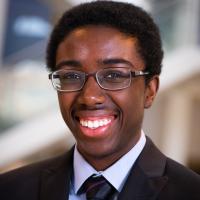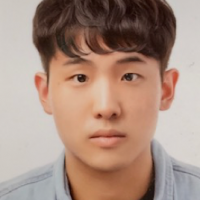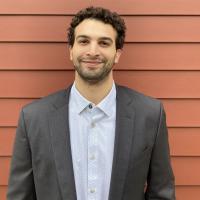T32 Training Program - Fellows

Kyle Thomas
2019 -
Kyle recently graduated from Washington University in St. Louis where he studied biomedical and systems engineering. His past research includes work with identifying the mechanisms behind ciliary beating and with developing microfluidic devices for chloride analysis in sweat. He is now a part of the Sam Sober Lab through the joint Georgia Tech and Emory BME PhD Program. His current research focuses on understanding how neural codes in the spinal cord change during sensorimotor adaptation.
Kyle recently graduated from Washington University in St. Louis where he studied biomedical and systems engineering. His past research includes work with identifying the mechanisms behind ciliary beating and with developing microfluidic devices for chloride analysis in sweat. He is now a part of the Sam Sober Lab through the joint Georgia Tech and Emory BME PhD Program. His current research focuses on understanding how neural codes in the spinal cord change during sensorimotor adaptation.

Nmachi Anumba
2019 -
Nmachi graduated from Penn State University in 2018 with a B.S. in Biomedical Engineering and a B.A. in Spanish. As an undergraduate she conducted research in the development of a portable MRI machine with Dr. Steven Schiff at Penn State and in the 3D printing of hydrogel MRI phantoms with Dr. Michael Lustig at the University of California, Berkeley. Her undergraduate thesis under Dr. Cheng Dong dealt with the migration of nanoparticles conjugated to immune cells across the Blood-Brain Barrier as a potential drug delivery technique. After graduating from Penn State, Nmachi was awarded as a Fulbright Scholar and spent 9 months in Puebla, Mexico assisting professors and graduate students in their academic English. Nmachi is currently a second year PhD student in Dr. Shella Keilholz's lab studying the role of locus coeruleus activity in Alzheimer's disease using optogenetics and fMRI.
Nmachi graduated from Penn State University in 2018 with a B.S. in Biomedical Engineering and a B.A. in Spanish. As an undergraduate she conducted research in the development of a portable MRI machine with Dr. Steven Schiff at Penn State and in the 3D printing of hydrogel MRI phantoms with Dr. Michael Lustig at the University of California, Berkeley. Her undergraduate thesis under Dr. Cheng Dong dealt with the migration of nanoparticles conjugated to immune cells across the Blood-Brain Barrier as a potential drug delivery technique. After graduating from Penn State, Nmachi was awarded as a Fulbright Scholar and spent 9 months in Puebla, Mexico assisting professors and graduate students in their academic English. Nmachi is currently a second year PhD student in Dr. Shella Keilholz's lab studying the role of locus coeruleus activity in Alzheimer's disease using optogenetics and fMRI.

Brianna Karpowicz
2019 -
Brianna completed a BSE in bioengineering at the University of Pennsylvania in 2019, where her research focused on understanding auditory information processing. She is currently a graduate student in Biomedical Engineering in the lab of Dr. Chethan Pandarinath. Her research interests focus on developing computational approaches to improve brain computer interface robustness.
Brianna completed a BSE in bioengineering at the University of Pennsylvania in 2019, where her research focused on understanding auditory information processing. She is currently a graduate student in Biomedical Engineering in the lab of Dr. Chethan Pandarinath. Her research interests focus on developing computational approaches to improve brain computer interface robustness.

Yahia Ali
2019 -
Yahia graduated from Georgia Tech in 2019 with a B.S. in biomedical engineering. As an undergraduate, his research focused on the development of a scalable rodent training system for studying the brain’s control of movement. Outside of the lab, he was also a member of the BME department's inaugural Developing World Capstone program, where he spent his senior year developing fetal heart monitor technology for use in low-resource areas. Now, as a PhD candidate in Prof. Chethan Pandarinath’s lab, Yahia combines his interests in neuroscience, machine learning, and medical technology to develop brain-machine interfaces that assist individuals with movement disorders.
Yahia graduated from Georgia Tech in 2019 with a B.S. in biomedical engineering. As an undergraduate, his research focused on the development of a scalable rodent training system for studying the brain’s control of movement. Outside of the lab, he was also a member of the BME department's inaugural Developing World Capstone program, where he spent his senior year developing fetal heart monitor technology for use in low-resource areas. Now, as a PhD candidate in Prof. Chethan Pandarinath’s lab, Yahia combines his interests in neuroscience, machine learning, and medical technology to develop brain-machine interfaces that assist individuals with movement disorders.

Erin Shappell
2020 -
Erin graduated from Clemson University in 2020 with a B.S. in computer engineering and a minor in psychology. As an undergraduate in Dr. Melissa Smith’s lab, she completed an honors thesis in EEG data prediction and seizure classification. She has also participated in two NSF REUs: one where she advanced a device that measures the vitality of yeast cells in beer brewing facilities and another where she developed a computational model of the rodent lower urinary tract. With her former REU advisor, Dr. Satish Nair, she is writing an e-book of neural engineering lessons and activities for K-12 teachers. As a graduate student at Georgia Tech’s bioengineering program, Erin hopes to apply her knowledge in computer engineering to a project in functional brain imaging or neural circuit modeling. As time permits, she hopes to continue her involvement in K-12 outreach.
Erin graduated from Clemson University in 2020 with a B.S. in computer engineering and a minor in psychology. As an undergraduate in Dr. Melissa Smith’s lab, she completed an honors thesis in EEG data prediction and seizure classification. She has also participated in two NSF REUs: one where she advanced a device that measures the vitality of yeast cells in beer brewing facilities and another where she developed a computational model of the rodent lower urinary tract. With her former REU advisor, Dr. Satish Nair, she is writing an e-book of neural engineering lessons and activities for K-12 teachers. As a graduate student at Georgia Tech’s bioengineering program, Erin hopes to apply her knowledge in computer engineering to a project in functional brain imaging or neural circuit modeling. As time permits, she hopes to continue her involvement in K-12 outreach.

Albert Lee
2020 -
Albert Lee graduated from Georgia Institute of Technology where he studied Neuroscience. As an undergraduate researcher in Pathology Dynamics Lab, his research focused on the development of in silico Wild-type and Amyotrophic Lateral Sclerosis mouse models of multi-factorial, multi-scalar, and temporal regulatory physiology. Albert is currently a graduate student in Machine Learning and hopes to study complex diseases using machine learning.
Albert Lee graduated from Georgia Institute of Technology where he studied Neuroscience. As an undergraduate researcher in Pathology Dynamics Lab, his research focused on the development of in silico Wild-type and Amyotrophic Lateral Sclerosis mouse models of multi-factorial, multi-scalar, and temporal regulatory physiology. Albert is currently a graduate student in Machine Learning and hopes to study complex diseases using machine learning.

David Weiss
2021 -
David Weiss graduated with an MSE in bioengineering from the University of Pennsylvania. His Master’s thesis under Dr. Timothy Lucas focused on developing computational models to evaluate the feasibility of using homodyne interferometry for real-time monitoring of neural activity. As a graduate student in Georgia Tech’s bioengineering program, David aims to investigate how the brain represents information and interprets exogenous signals in order to improve sensory prostheses.
David Weiss graduated with an MSE in bioengineering from the University of Pennsylvania. His Master’s thesis under Dr. Timothy Lucas focused on developing computational models to evaluate the feasibility of using homodyne interferometry for real-time monitoring of neural activity. As a graduate student in Georgia Tech’s bioengineering program, David aims to investigate how the brain represents information and interprets exogenous signals in order to improve sensory prostheses.

Farhan Rahman
2021 -
Farhan graduated from Arizona State University in 2020 with a B.S.E. in Electrical Engineering and a B.S. in Computer Science. As an undergraduate student, he completed his honors thesis in Dr. Pavan Turaga’s Geometric Media Lab under an NSF REU grant. His undergraduate research focused on using a novel signal processing technique and machine learning on movement data to classify Parkinson’s disease patients from healthy individuals and rate the severity of their disease. Now a Ph.D. student in Georgia Tech’s Electrical Engineering program, Farhan hopes to combine his skillsets in both hardware and software to develop biomedical systems for the analysis of neurological data. He hopes that his research can be utilized for advances in treatments for neurological diseases and ailments.
Farhan graduated from Arizona State University in 2020 with a B.S.E. in Electrical Engineering and a B.S. in Computer Science. As an undergraduate student, he completed his honors thesis in Dr. Pavan Turaga’s Geometric Media Lab under an NSF REU grant. His undergraduate research focused on using a novel signal processing technique and machine learning on movement data to classify Parkinson’s disease patients from healthy individuals and rate the severity of their disease. Now a Ph.D. student in Georgia Tech’s Electrical Engineering program, Farhan hopes to combine his skillsets in both hardware and software to develop biomedical systems for the analysis of neurological data. He hopes that his research can be utilized for advances in treatments for neurological diseases and ailments.
